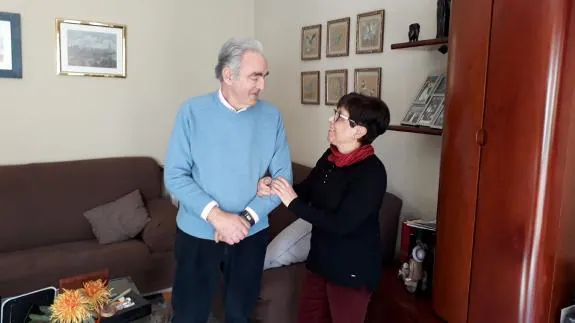

Sections
Highlight

SUSANA ZAMORA
Friday, 23 March 2018, 11:23
Compartir
Francisco Cervera was dependent on a machine for nearly ten years. He needed it so that his polycystic kidneys could keep functioning and he could stay alive. At first it was peritoneal dialysis at home; then, hemodialysis three times per week in the Parc Taulí de Sabadell Hospital.
The days I had treatment were pretty much lost, because I was very tired when I got home and I had to give up other activities, explains Francisco. The months passed and his health worsened. The solution? A kidney transplant.
In Spain more than 3,000 are carried out every year. It is one of the most frequent transplants with the best prognosis, but in Francisco's case it was different. The difficulty wasn't in finding a donor. His wife had always made it clear that, if she were compatible, she would give him a kidney, and that was what happened.
The real problem was finding a public hospital that would respect their beliefs as Jehovah's Witnesses and that was prepared to carry out the transplant without the use of a blood transfusion, which goes against their beliefs.
The beliefs of this branch of Christianity, which in Spain has 113,000 active members according to the register of religious bodies compiled by the Ministry of Justice, prevents them from receiving blood from another person during this type of operation. According to jw.org: There are convincing medical reasons to reject them. However, the main reason why God has told us to reject them is that blood is represented as sacred in the Bible (Leviticus 17:11, Colossians 1:20).
The Hospital del Mar in Barcelona was prepared to carry out the operation, adhering to the specifications outlined by the couple from Barberà del Vallés (Catalonia). An entire team of surgeons (nephrologists, urologists, kidney surgeons and anaesthetists) were prepared to accept the restrictions and designed a specially-adapted procedure which was carried out in September 2016.
At the time, only the Complejo Universitario hospital in La Coruña had done the surgery without a blood transfusion and they had carried out several operations on Jehovah's Witnesses. The likelihood that a blood transfusion will be needed during kidney surgery is around 40 per cent. If the surgeons are skilled and you are able to establish specific measures to minimise the need for blood, then the risk is reduced to a minimum, highlights Julio Pascual, head of the Nephrology Service and medical director of the Hospital del Mar. During the pre-operative period, his patients are given erythropoietin (EPO), a hormone that stimulates the production of red blood cells. So, we raise the level of red blood cells so that during the surgery, if blood is lost, we remain within the safety margins for the patient.
Over the course of the operation, the medical team also uses a machine to raise the production of red blood cells (' a cell server') to make up for the blood that the patient loses during the operation and, after a cleaning process, the extra blood cells can be introduced if necessary.
In the post-operation stage, when we have to be particularly careful, instead of three people monitoring them, we have ten. If following a conventional operation the patient's kidney starts to bleed, the first thing to do is transfer blood and operate if necessary. However, with a Jehovah's Witness, we have to use anticoagulants and in Barberà del Vallés, in some cases, use dialysis if the kidney is at risk, explains Pascual. Despite his confidence in the procedure, the specialist doesn't hide the enormous stress, because we were doing something that few people have dared to do.
But the risks mentioned by Pascual never scared Francisco Cervera and his wife and donor, Rosa María Molins. Since we arrived at the hospital, everything seemed simple and we were told that the doctors were happy to respect our beliefs and not transfer blood; not even in a critical situation, explains Molins. Her husband notes: We have to be consistent with what we believe, whether we are living through good times or bad.
Doctor Lluís Cecchini, head of Urology and transplant surgery at the Hospital del Mar, wonders up to what point it is ethical for a medic not to offer transplant treatment to a patient who demands that the procedure be carried out without a blood transplant, when in half of cases it wouldn't be necessary.
If a patient holds their religious beliefs as more important than their own life, what right does a doctor have to decide for them? If an agreement is made, it has to be respected, he said.
active members of the Jehovah's Witnesses in Spain, according to a register of religious bodies carried out by the Ministry of Justice. This denomination of Christianity has around eight million followers worldwide.
Publicidad
Publicidad
Publicidad
Publicidad
Reporta un error en esta noticia
Necesitas ser suscriptor para poder votar.